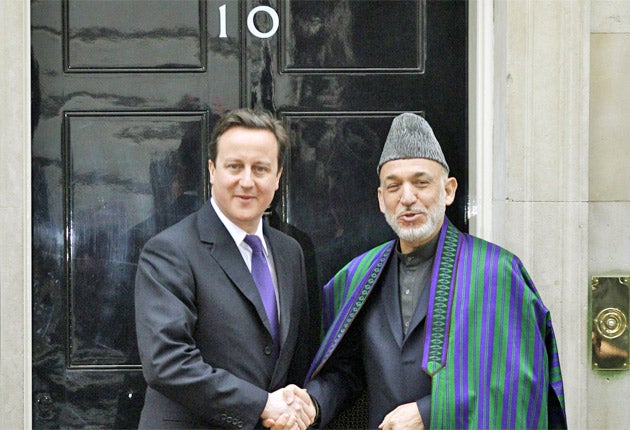Military surge 'threat to Afghan political future'

The military surge in Afghanistan is in danger of derailing moves to ensure a peaceful political solution to the crisis, an all-party group of MPs warns in a critical report published today.
In a sign that the political consensus in Britain in favour of the US-led operation in Afghanistan is breaking down, the Foreign Affairs Select Committee question David Cameron's approach and express fears that the 10-year military campaign could end in failure. The MPs say it must be accompanied by a "political surge" in which the US holds talks with Taliban leaders.
They also cast doubt on the official justification for the presence of British troops in the country, saying it is not clear they help to prevent terrorist attacks in the UK because al-Qa'ida has been weakened.
Today's report could mark a turning point in the debate on Afghanistan. Although a growing number of UK politicians question in private whether the war is winnable, most have been reluctant to go public because they do not want to undermine British forces.
Today's report will make uncomfortable reading for Mr Cameron. The MPs say the security rationale behind his announcement of a 2015 deadline for the unconditional withdrawal of UK combat forces remains unclear and warn of "potential risks." And they criticise as " inappropriate and unhelpful" his public rebuke to Pakistan for its record on counter-terrorism during his visit to India last year.
Richard Ottaway, the committee's Tory chairman, said: "There is a danger that without appropriate political leadership, the current military campaign is in danger of inadvertently derailing efforts to secure a political solution to what is essentially a political problem.
"The US should not delay its significant involvement in talks with the Taliban leadership because, without US support, there can be no longer-term peace in Afghanistan."
He added: "We question the fundamental assumption that success in Afghanistan can be 'bought' through a strategy of 'clear, hold and build'. We question the Government's logic that a full-scale counter-insurgency campaign aimed at the Taliban is necessary to prevent al-Qa'ida returning or that it could ever succeed."
The MPs suggest that the Government is failing to communicate the reasons for the presence of foreign troops both to the Afghan population and the British public. They say it is "a matter of considerable concern" that civilian casualties in Afghanistan have risen so sharply since the start of the military surge, saying they have caused "heightened instability and suspicion."
The committee warns that serious questions remain about the quality of the Afghan security forces that will take over from the International Security Assistance Force.
However, Mr Cameron said yesterday that he remained "cautiously optimistic" about progress. At a press conference with the Afghan President, Hamid Karzai, in Downing Street, he insisted the Afghan forces were "increasingly successful".
Calling for "real progress" on the political front, the Prime Minister said: "It is time for the Taliban to start this journey and make this year the decisive year for peace in Afghanistan."
Join our commenting forum
Join thought-provoking conversations, follow other Independent readers and see their replies
Comments
Bookmark popover
Removed from bookmarks